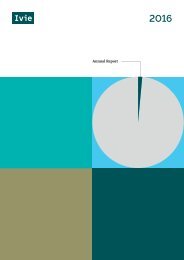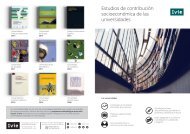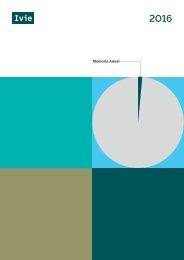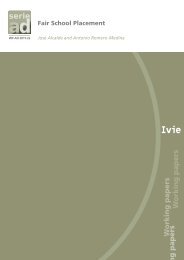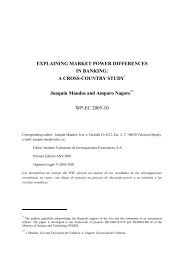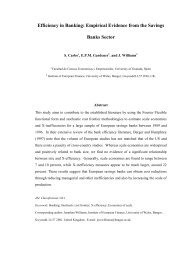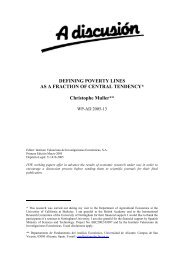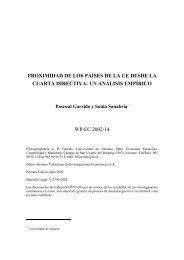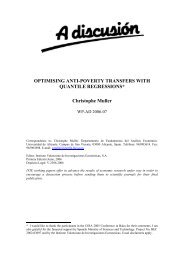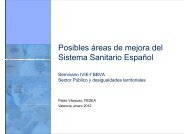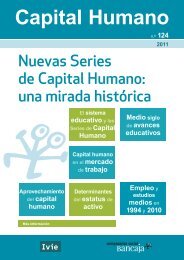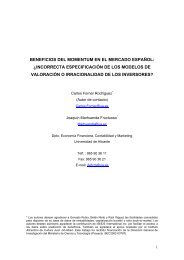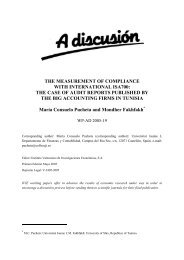Create successful ePaper yourself
Turn your PDF publications into a flip-book with our unique Google optimized e-Paper software.
⎯ The development of a new methodology for the measurement of knowledge-based activities, which<br />
has resulted in a database on knowledge intensive GDP and a <strong>report</strong> containing the main results.<br />
⎯ The formation of the ABACO library, that stores and provides systematized access to a wide range of<br />
<strong>report</strong>s, working papers and publications on knowledge economics, ICT, R&D, human capital and<br />
entrepreneurship, among others, both at national and international levels.<br />
⎯ The design, development and opening to the public of ABACO’s website, www.observatorioabaco.es,<br />
which includes the main results of the project.<br />
⎯ The organization of a conference presentation of the ABACO project.<br />
⎯ The establishment of the ABACO community, made up by the main regional knowledge producers<br />
and users, which aim is to promote initiatives to generate shared visions of the current situation and<br />
the development of knowledge-based activities.<br />
Research team:<br />
Francisco Pérez (dir.) (<strong>Ivie</strong>, Universitat de València)<br />
Javier Quesada (<strong>Ivie</strong>, Universitat de València)<br />
Eva Benages (<strong>Ivie</strong>)<br />
Pilar Chorén (<strong>Ivie</strong>, Universitat de València)<br />
Héctor García (<strong>Ivie</strong>)<br />
Maria Llop (<strong>Ivie</strong>)<br />
Belén Miravalles (<strong>Ivie</strong>)<br />
Cristina Navarro (Universitat de València)<br />
Juan Pérez (<strong>Ivie</strong>)<br />
Jimena Salamanca (<strong>Ivie</strong>)<br />
David Villada (Universitat de València)<br />
• PERFORMANCE INDICATORS OF SPANISH UNIVERSITIES (2011-2013)<br />
The purpose of this project commissioned by five Valencian public universities is to build a system of<br />
performance indicators of Spanish universities of wide coverage, rigorous in its approach and properly framed<br />
in the international initiatives in this area: the Programme on Institutional Management in Higher Education<br />
(IMHE) led by the OECD, the International Ranking Expert Group (IREG) founded by the UNESCO European<br />
Centre for Higher Education (UNESCO-CEPES) and the EUA Rankings Review Report.<br />
The research is approached from the careful analysis of the information provided by the simple and synthetic<br />
indices used, assessing the criteria for aggregation of simple indicators, the sensitivity of the synthetic indices<br />
and the rankings resulting from changes in the aggregation procedures.<br />
In 2012, a website with the results of the project has been built, the two main sections being: Spanish<br />
Universities Rankings, which detail the results of the aggregates; and Where to study?, an interactive tool in<br />
which students will be able to construct their own rankings of universities according to their study choices,<br />
geographical and academic. The website will also provide the information used to build the rankings, as well as<br />
a summary of the methodological approach applied.<br />
Research team:<br />
Francisco Pérez (<strong>Ivie</strong>, Universitat de València)<br />
Antonio Villar (<strong>Ivie</strong>, Universidad Pablo de Olavide)<br />
Francisco J. Goerlich (<strong>Ivie</strong>, Universitat de València)<br />
José Manuel Pastor (<strong>Ivie</strong>, Universitat de València)<br />
Joaquín Aldás (<strong>Ivie</strong>, Universitat de València)<br />
Rodrigo Aragón (<strong>Ivie</strong>)<br />
Vicent Cucarella (<strong>Ivie</strong>)<br />
Abel Fernández (<strong>Ivie</strong>, Universitat de València)<br />
52 Research and economic studies



